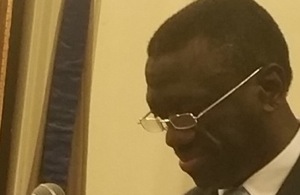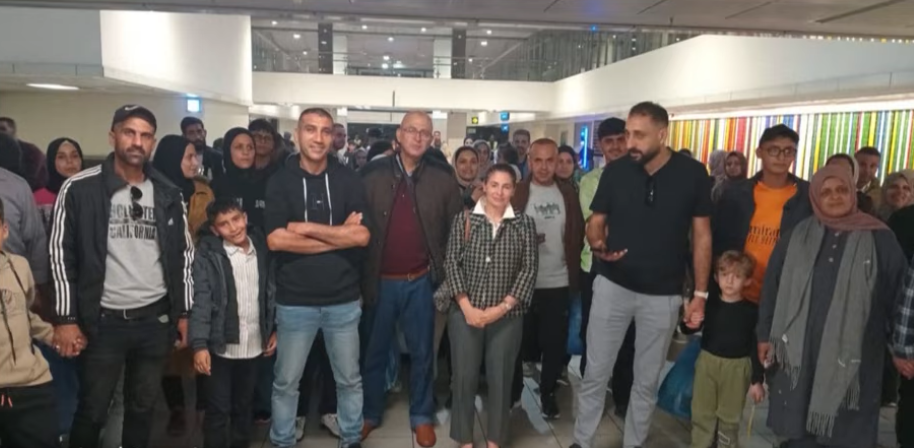Dr. Besigye at the New York City Bar Association
Overthrowing Gen. Yoweri Museveni’s dictatorship by force of arms wouldn’t be difficult, Dr. Kizza Besigye told an attentive audience in New York City that included top American lawyers, human rights activists, and the Ugandan Diaspora community, on Thursday.
It would only take “a few” guns because Gen. Museveni had lost support of the people and the masses now backed the defiance campaign.
Dr. Besigye drew an analogy between Museveni today and President Milton Obote by the time he was overthrown in 1985 — the latter had also lost popular support, he said.
Dr. Besigye pointed out that removing Museveni by force of arms would simply produce a new dictatorship.
“Once you do that you are simply replacing the guns with other guns,” he said, noting that’s been the trend since Uganda’s independence. “The new guns will not be controlled by the population so they will start doing exactly what the old guns were doing.”
Dr. Besigye said the nation-wide defiance campaign he’d called for was meant to change the mind-set of Ugandans and to empower them “so that they demystify the power of the gun and eventually overwhelm the gun.” He added: “And once that happens it is change forever and people will know that they cannot be dominated and subjugated by the gun.”
“I’m a prisoner,” Dr. Besigye, who was speaking at the prestigious New York City Bar Association before an audience that found it difficult to understand how the U.S could be the prime sponsor of Gen. Museveni’s 30-year dictatorship, said.
He went on to explain that the alleged crimes the Ugandan regime had accused him of was having been sworn in on May 11 as president following the February 18 presidential election and declaring a “defiance” campaign.
The defiance campaign had already succeeded in empowering Ugandans at the grassroots to take collective action to influence things that impacted their daily lives, the former flag-bearer of the Forum for Democratic Change (FDC), who is widely believed to have won the February vote, said.
Dr. Besigye recalled how traders, many of whom are critical in supplying food and consumer goods were being harassed by the regime — with arbitrary tax hikes and expulsions. Finally, they took a stand and defied the regime by shutting down their stores until demands that the attacks against them stopped. In the end the regime agreed to their terms and came back on its knees.
He also recalled how Ugandans blocked a section of a road that hadn’t been repaired and said no vehicle would be allowed to pass until the road was properly repaired. He also recalled the supporters who turned out to his campaign rallies –hundreds of thousands of them throughout the country– many of whom handed him part of their hard-earned cash to help finance his campaign. “The defiance campaign is working,” he said.
Dr. Besigye said the problem of regime illegitimacy wasn’t unique to Uganda. The colonial powers had stripped Africans of citizenship, turning people into subjects. After independence the power structure remained intact –rulers like Museveni remained the new masters while the people were subjects. “We must regain our citizenship, first and foremost,” he said.
Dr. Besigye said a country doesn’t have citizens if the people: are brutalized by the police forces who are paid with their tax dollars; the people do not determine who rules them; the people do not determine how the country’s natural resources were deployed; and, the people do not have access to an independent judiciary.
He painted a bleak picture of a dysfunctional Ugandan state — essentially a one-man show buttressed by the armed services.
He recalled attacks in broad daylight against the court by the armed forces to intimidate the judiciary before it rendered a decision. He recalled Museveni threatening judges that he would return “to the bush,” reference to armed struggle, when they conducted work stoppage.
Dr. Besigye recalled the brutal indiscriminate beating unleashed by the police on ordinary citizens who had pored on the streets to celebrate his release on bail on July 12, in connection to his treason trial.
Afterwards when Uganda’s national police commander, Gen. Kale Kayihura, was asked about the ugly attacks during a press conference, he said he didn’t see a problem with it since “sticks don’t kill,” Dr. Besigye recalled.
What’s more the government also saved money by not having to use teargas, Kayihura had noted.
Dr. Besigye highlighted “unprecedented” corruption in Uganda including the theft of “four trillion shillings” in public funds allocated for road repairs.
Dr. Besigye told the audience of a parliament dominated and abused by Gen. Museveni. He recalled how Museveni had paid members of Parliament “five million shillings” each to lift presidential term limits from Uganda’s 1995 constitution.
The next constitutional barrier Museveni now wanted eliminated is the age-limit; currently it bars anyone age 75 and above from running for the presidency and Museveni is officially 72 although he’s believed to be over 75.
He said Parliament also wants to make it easier for the regime to seize people’s private land –without paying for it– while making the dubious claim that it would be put to public use.
Dr. Besigye recalled how Gen. Museveni cowed Members of Parliament after they’d voted in 10 tough measures to regulate the country’s oil industry.
Since Gen. Museveni is also chairman of the ruling National Resistance Movement (NRM) party, he bussed the parliamentarians to a regime ideological indoctrination camp where they were all forced to don military uniforms and salute the dictator who also wore uniform.
The parliamentarians were forced to perform army drills for one week. When they returned to Parliament, they reversed their previous votes on the laws governing the oil industry.
Dr. Besigye said dictatorship in Uganda will end since the people have now awoken to a new consciousness and new tools for collective action in their nation-wide defiance campaign.
“You only get power from people giving it to you,” Dr. Besigye said. “When people withdraw their cooperation, you lose power.”
The defiance campaign is withdrawal of cooperation from the Museveni regime.






